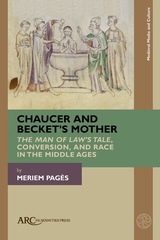112 books about Constitutional law and 4
start with U
112 books about Constitutional law and 4
112 books about Constitutional law
4 start with U start with U
4 start with U start with U
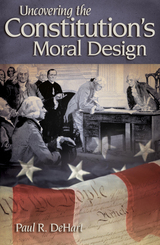
Uncovering the Constitution's Moral Design
Paul R. DeHart
University of Missouri Press, 2007
The U.S. Constitution provides a framework for our laws, but what does it have to say about morality? Paul DeHart ferrets out that document’s implicit moral assumptions, demonstrating that the Constitution presupposes a natural law to which human law must conform. His argument works toward resolving current debates over the Constitution’s normative framework while remaining detached from the social issues that divide today’s political arena.
In critiquing previous attempts at describing and evaluating the Constitution’s normative framework, DeHart demonstrates that the Constitution’s moral framework corresponds largely to classical moral theory. Using the method of Inference to the Best Explanation to ascertain our Constitution’s moral meaning, he challenges the logical coherency of modern moral philosophy, normative positivism, and other theories that the Constitution has been argued to embody, offering instead an innovative methodology that can be applied to uncovering the normative framework of other constitutions as well.
In critiquing previous attempts at describing and evaluating the Constitution’s normative framework, DeHart demonstrates that the Constitution’s moral framework corresponds largely to classical moral theory. Using the method of Inference to the Best Explanation to ascertain our Constitution’s moral meaning, he challenges the logical coherency of modern moral philosophy, normative positivism, and other theories that the Constitution has been argued to embody, offering instead an innovative methodology that can be applied to uncovering the normative framework of other constitutions as well.
[more]
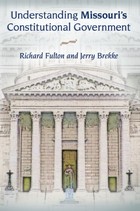
Understanding Missouri's Constitutional Government
Richard Fulton and Jerry Brekke
University of Missouri Press, 2010
In the study of American government, analysis of state governments is often neglected in favor of concentration on the national system. Certainly in-depth knowledge of our country’s constitutional structure is critical to an understanding of American government, but this continuing inattention to the complexities of state governments has left a hole in the literature available to help us understand the role state governments play in the federal system. State constitutions served as guides for the construction of the U.S. Constitution, but they have their own character and significance. As such, it is imperative that teachers, students, and historians fully understand the creation, administration, and adjudication of state governments.
Understanding Missouri’s Constitutional Government presents a case study in the foundations of state governments. The book provides a sweeping look at the constitutional foundations of the processes of Missouri government. Authors Richard Fulton and Jerry Brekke place Missouri within the context of our larger federal system while using the state’s constitution as a touchstone for the discussion of each element of state government.
Understanding Missouri’s Constitutional Government has a dual framework specifically designed to enhance the reader’s learning experience. First, the essential elements of government outlined in the constitution are introduced, and then analysis and interpretation of each of the document’s articles is covered. This organization permits readers to build an understanding of a particular element—for example, the legislature—by learning its fundamental organization, processes, and purposes in a straightforward manner. After gaining that primary perspective, the reader can use the formal analysis in the second section to explore interpretations of each article. Not only helpful to the general reader, this two-part structure makes the text especially useful in courses on American government, state and local governments, and particularly Missouri government and constitution.
In short, Understanding Missouri’s Constitutional Government is an approachable, valuable exposition on Missouri government as reflected in the day-to-day operations outlined in the Missouri constitution. It fills a significant gap in the literature on the interpretation, use, and operation of state constitutions. Since Missouri law dictates that all levels of education should teach government and constitution at the national and state levels, this book will be an indispensable resource for educators while serving as a valuable reference for journalists and public officials in the state.
Understanding Missouri’s Constitutional Government presents a case study in the foundations of state governments. The book provides a sweeping look at the constitutional foundations of the processes of Missouri government. Authors Richard Fulton and Jerry Brekke place Missouri within the context of our larger federal system while using the state’s constitution as a touchstone for the discussion of each element of state government.
Understanding Missouri’s Constitutional Government has a dual framework specifically designed to enhance the reader’s learning experience. First, the essential elements of government outlined in the constitution are introduced, and then analysis and interpretation of each of the document’s articles is covered. This organization permits readers to build an understanding of a particular element—for example, the legislature—by learning its fundamental organization, processes, and purposes in a straightforward manner. After gaining that primary perspective, the reader can use the formal analysis in the second section to explore interpretations of each article. Not only helpful to the general reader, this two-part structure makes the text especially useful in courses on American government, state and local governments, and particularly Missouri government and constitution.
In short, Understanding Missouri’s Constitutional Government is an approachable, valuable exposition on Missouri government as reflected in the day-to-day operations outlined in the Missouri constitution. It fills a significant gap in the literature on the interpretation, use, and operation of state constitutions. Since Missouri law dictates that all levels of education should teach government and constitution at the national and state levels, this book will be an indispensable resource for educators while serving as a valuable reference for journalists and public officials in the state.
[more]
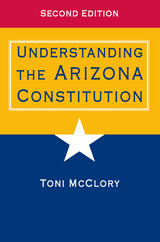
Understanding the Arizona Constitution
Toni McClory
University of Arizona Press, 2010
Arizona became the nation’s 48th state in 1912 and since that time the Arizona constitution has served as the template by which the state is governed. Toni McClory’s Understanding the Arizona Constitution has offered insight into the inner workings and interpretations of the document—and the government that it established—for almost a decade.
Since the book’s first publication, significant constitutional changes have occurred, some even altering the very structure of state government itself. There have been dramatic veto battles, protracted budget wars, and other interbranch conflicts that have generated landmark constitutional rulings from the state courts. The new edition of this handy reference addresses many of the latest issues, including legislative term limits, Arizona’s new redistricting system, educational issues, like the controversial school voucher program, and the influence of special-interest money in the legislature. A total of 63 propositions have reached the ballot, spawning heated controversies over same-sex marriage, immigration, and other hot-button social issues.
This book is the definitive guide to Arizona government and serves as a solid introductory text for classes on the Arizona Constitution. Extensive endnotes make it a useful reference for professionals within the government. Finally, it serves as a tool for any engaged citizen looking for information about online government resources, administrative rules, and voter rights. Comprehensive and clearly written, this book belongs on every Arizonan’s bookshelf.
Since the book’s first publication, significant constitutional changes have occurred, some even altering the very structure of state government itself. There have been dramatic veto battles, protracted budget wars, and other interbranch conflicts that have generated landmark constitutional rulings from the state courts. The new edition of this handy reference addresses many of the latest issues, including legislative term limits, Arizona’s new redistricting system, educational issues, like the controversial school voucher program, and the influence of special-interest money in the legislature. A total of 63 propositions have reached the ballot, spawning heated controversies over same-sex marriage, immigration, and other hot-button social issues.
This book is the definitive guide to Arizona government and serves as a solid introductory text for classes on the Arizona Constitution. Extensive endnotes make it a useful reference for professionals within the government. Finally, it serves as a tool for any engaged citizen looking for information about online government resources, administrative rules, and voter rights. Comprehensive and clearly written, this book belongs on every Arizonan’s bookshelf.
[more]
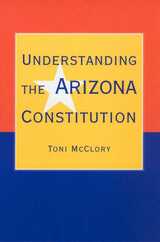
Understanding the Arizona Constitution
Toni McClory
University of Arizona Press, 2001
An authoritative guide to Arizona government— written in plain language!
How do laws make their way through the state legislature?
What are the specific powers of the governor?
How do the courts make public policy?
Can citizens change the constitution? A leading lawyer and college educator who was an assistant attorney general through six governors, Toni McClory has written a definitive guide to Arizona government that is as comprehensive as it is easy to understand. It provides a thorough explanation of the state's constitution and shows the impact that its unique features have had on the everyday operation of the state's political system. Thoroughly up to date and clearly written, this book belongs on every Arizonan's shelf. Much of the information it contains is based on original research compiled by the author from primary sources and draws on her direct experience with government processes, officials, and events. - For concerned citizens, it offers topics of special interest to voters—including facts about initiatives and referenda and a chapter on local government—and contains references to online government resources.
- For lawyers and business people, it makes available a brief yet sophisticated synopsis of state government along with a wealth of citations and supporting detail.
- For students and teachers, it offers an exceptionally readable introductory text that relies heavily on primary sources and features "pro and con" passages-examining both sides of important issues-that are designed to stimulate critical thinking. From administrative rules to water law, Understanding the Arizona Constitution is your complete guide to the inner workings of the state. It is an essential reference for today's citizens and tomorrow's leaders.
[more]
READERS
Browse our collection.
PUBLISHERS
See BiblioVault's publisher services.
STUDENT SERVICES
Files for college accessibility offices.
UChicago Accessibility Resources
home | accessibility | search | about | contact us
BiblioVault ® 2001 - 2024
The University of Chicago Press


